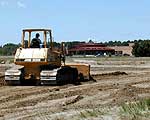By Tom Robertson
Minnesota Public Radio
August 6, 2002
Last year, the Red Lake Band of Chippewa settled a longstanding dispute with the federal government. Red Lake claimed the Bureau of Indian Affairs mismanaged the band's forests. As a result, the tribe lost millions in timber revenue. Now, the band will get more than $53 million in compensation. They'll use it to restore 50,000 acres of pine forest.
| |
|
|
|
||
In the early 1900s, the Red Lake Reservation was a sea of pine forest. The tribe owned thousands of acres of virgin timber. Under a 1916 act of Congress, the federal government was supposed to manage that forest. But tribal officials say the Bureau of Indian Affairs allowed too much clearcutting and sold the timber too cheaply.
Jodie Beaulieu directs the tribe's library and archives. She says over the past 80 years, the band lost nearly $400 million in timber revenue.
"Big loggers and foresters and the timber barons that are still filthy rich today, all profited off the Red Lake resources," said Beaulieu. "And the government was supposed to have protected those. ... We would be filthy rich today if our forest had been managed the way it should have been."
On a 40-acre site near Red Lake's elementary school, heavy equipment clears the way for construction of a state-of-the-art greenhouse, where the band will grow seedling pines. Then, they'll plant them on thousands of acres that were clear cut decades ago.
| |
|
|
|
||
Last year's settlement sets aside $40 million dollars for reforestation. Red Lake will use the interest earned on the fund to build the greenhouse and restore the pine forest. BIA forester Clair Fetzer says the process will take a long time.
"The reforestation will be about 1,000 acres a year for the next 50 years," said Fetzer. "And we need roughly a million seedlings a year to do that. And that's what the greenhouse will provide us."
Records show the tribe once had 60,000 acres of pine forest. Only 10,000 of those remain. Fetzer says the federal government approved the clearcutting, but the acreage was never replanted. The forest was overgrown with aspen.
"Pine is worth more. It will provide more income, more jobs," said Fetzer. "We've been reforesting. Part of the problem is we've never had the budget before. We haven't had the people or the money to actually do it. And what we've been growing is the cheap stuff."
The band will cut some trees and allow others to reach maturity. Fetzer says band members are also concerned about maintaining the forests for wildlife and cultural activities.
|
"Big loggers and foresters and the timber barons, that are still filthy rich today, all profited off the Red Lake resources... We would be filthy rich today if our forest had been managed the way it should have been."
- Jodie Beaulieu, Red Lake Band |
"What we're trying to do is set aside the areas we know that are berry-picking areas, maple-syruping areas, cultural burial sites," Fetzer said. "Identifying those and setting them aside, staying away from them, trying to minimize the conflict there."
Red Lake's $53.5 million settlement with the federal government is the largest in history to an Indian tribe. Once the reforestation program is funded and the attorneys are paid, the rest of the money goes to tribal members. It amounts to about $1,100 per adult.
Red Lake archivist Jodie Beaulieu says the people should get more. Beaulieu is the niece of the late Roger Jourdain. He was Red Lake's first and longest-serving tribal chairman. Beaulieu says her uncle would have been disappointed the tribe settled the case.
"He had that foresight, you know, and he was willing to give up and fight this battle for this many years," said Beaulieu. "Yet he didn't live long enough to, and maybe it's a blessing in disguise, because it would have been a slap in his face that we sold out for $1,081."
But Beaulieu says the money and the reforestation project will still mean a lot to the reservation. Unemployment has reached nearly 60 percent.
"This greenhouse now is giving us a new start," she said. "It's going to be up to us to preserve our resources and manage them in a way that it should have been all along."
Hundreds of band members will get jobs in the greenhouse, and they'll plant trees for the reforestation project. Meanwhile, tribal officials say the payments to band members should be in the mail within the next few months.


